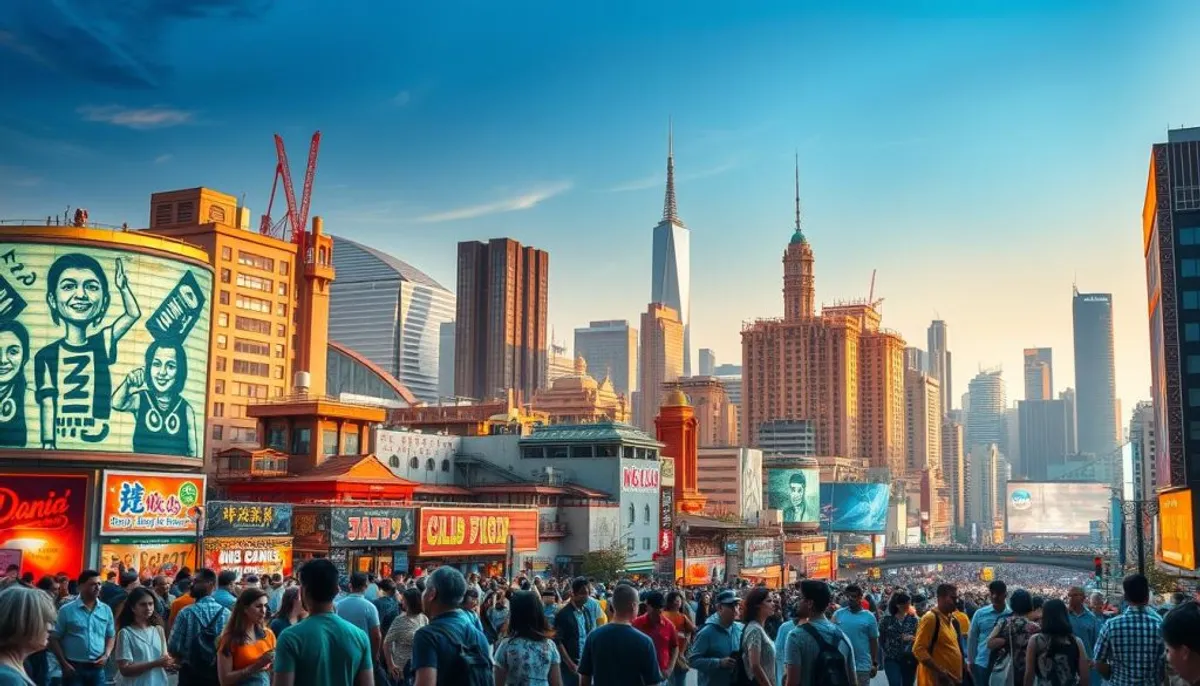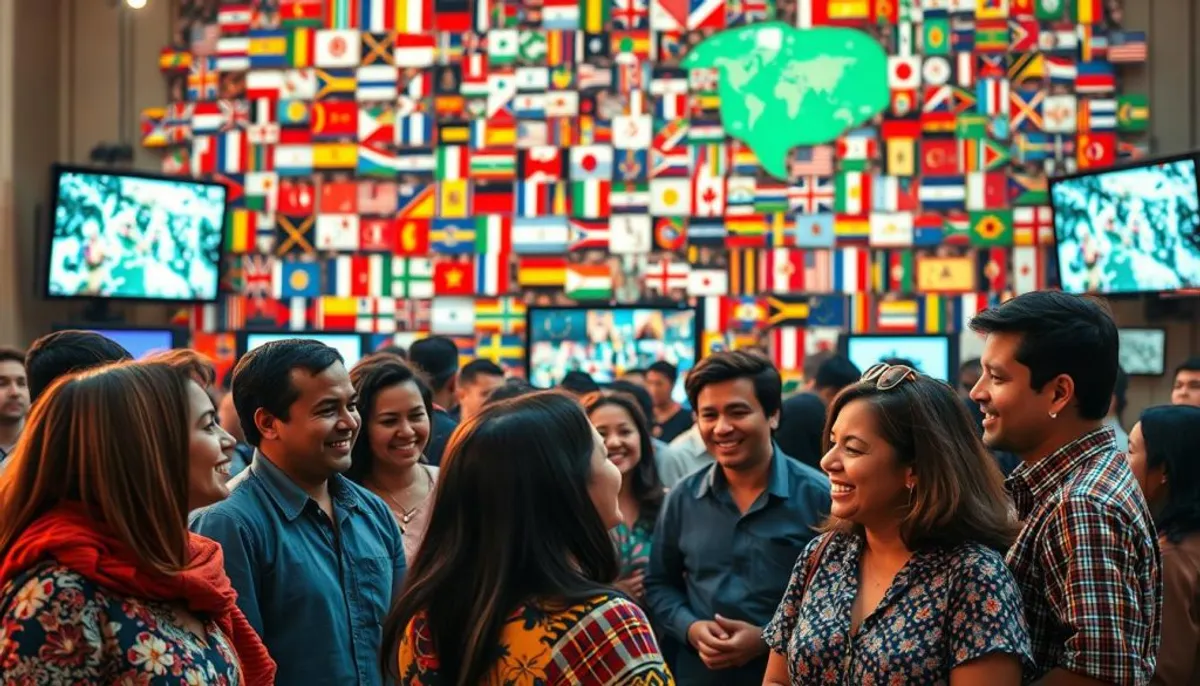Culture, this profound expression of our humanity, undeniably shapes our society. It influences our values, behaviors, and creativity. This transformative force is essential to the evolution of our communities and institutions.
The cultural influences extend beyond the artistic realm. They penetrate our economy, education, and health. In Ontario, culture generated about 22 billion dollars in GDP in 2010, creating nearly 280,000 jobs. These figures illustrate the economic importance of this sector.

The effect of culture is also palpable in our schools. Students involved in artistic activities are three times more likely to graduate. This statistic demonstrates the role of culture in personal growth and academic success.
In our digital age, the effect of culture takes on new forms. Interactive multimedia products stimulate growth, while platforms like Wikipedia show a trend towards a sharing economy. These developments demonstrate culture's ability to adapt and influence technological innovations.
Cultural transformation in the modern era
The modern era profoundly transforms our cultural heritage. Traditions and values are rapidly evolving, reflecting a growing cultural diversity. This transformation affects all aspects of our society.
The evolution of traditions and values
Surveys conducted between 2003 and 2008 reveal a shift in cultural practices. The notion of "cultural crisis" has intensified since the late 19th century. This evolution is accompanied by a multiplication of cultural identities, enriching our cultural diversity.
The impact of digital technology on cultural practices
Digital technology redefines our modes of expression and interaction. Technologies offer new forms of social exchange and stimulate creativity. This phenomenon transforms our relationship with cultural heritage, making it more accessible and interactive.
| Cultural Aspect | Before the digital age | After the digital age |
|---|---|---|
| Access to culture | Limited, a privilege of class | Dramatized, widely disseminated |
| Cultural transmission | Mainly local | Global, instantaneous |
| Artistic expression | Traditional formats | New media, digital art |
The role of media in cultural transmission
Media play a crucial role in transmitting cultural heritage. They shape our perception of cultural diversity. The late 1980s saw the emergence of "cultural mediators" in institutions, facilitating access to culture for all.

This cultural transformation continues to redefine our society. It reflects a growing richness of our cultural heritage while posing new challenges for its preservation and transmission, particularly regarding ethnocentrism that can influence our cultural perceptions and interactions.
The effect of culture on innovation and creativity
Culture is fundamental to innovation and creativity in contemporary businesses. The clash of cultures and acculturation foster the creation of original ideas. These ideas are crucial for remaining competitive in the post-industrial economy.
A Forbes study reveals that 82% of companies consider innovation essential to their long-term strategy. This approach manifests in tangible results: innovative companies generate 20% more revenue than their competitors.

The work environment has a significant impact on creativity. Well-designed spaces can boost productivity by 20%. Moreover, 75% of employees feel more motivated in environments where their ideas are valued.
The clash of cultures in diverse teams stimulates creativity. Companies that promote this diversity see their financial growth increase by 3.5 times. Acculturation encourages adaptation and continuous innovation.
| Factor | Impact on innovation |
|---|---|
| Open environment for experimentation | 5 times more likely to achieve high financial performance |
| Encouragement of creativity | 20% increase in collective performance |
| Agile practices | Adopted by 71% of companies |
| Well-directed brainstorming sessions | 50% increase in idea production |
To remain competitive, companies must create an environment conducive to innovation. Valuing cultural diversity and encouraging acculturation are essential practices. These approaches foster the emergence of innovative ideas and strengthen companies' positions in today's creative economy.
The socio-economic dimensions of culture
Culture occupies a central place in our society, influencing our behaviors and the economy. Since the 1960s, the economic approach to culture has undergone significant evolution, especially in France. This transformation has profoundly altered our understanding of the interactions between culture and economy.
The cultural influence on consumption behaviors
Individuals' consumption choices are deeply rooted in their cultural context. Cultural syncretism, resulting from the blending of traditions, creates new consumption trends. To remain competitive in a globalized market, companies must grasp these nuances while considering the importance of personal growth in consumer decisions.
Culture as an economic driver
The cultural economy has developed as a distinct sector. Since the 1970s, economic analysis of cultural markets has intensified. The creation of the Association for the Development and Dissemination of Cultural Economy illustrates this evolution. Public spending in this area has significantly increased, highlighting its economic importance.
The impact on business strategies
Cultural relativism influences international business strategies. To succeed, companies must offer a rich experience that goes beyond merely selling products. This approach allows differentiation in a post-industrial economy where culture becomes a major strategic asset.
Integrating the cultural dimension into economic strategies is now essential. It offers new perspectives for growth and innovation while posing complex challenges for companies operating in a culturally diverse world.
Cultural diversity and its contemporary challenges
Cultural diversity is a pillar of our modern society, bringing invaluable richness. UNESCO recognized its importance by adopting the Convention on the Protection and Promotion of the Diversity of Cultural Expressions in 2005. This decision underscores the value of cultural diversity as a common heritage of humanity.
Cultural syncretism in globalization
Globalization intensifies interactions between cultures, creating new forms of expression. World music, for example, is gaining popularity and integrating into Western cultural policies. This phenomenon reflects the evolution towards multicultural societies and fosters intercultural dialogue.
The challenges of cultural identity
In the face of homogenization, preserving cultural identity becomes a major challenge. Ethnocentrism can hinder openness to other cultures. However, companies that value cultural diversity show 33% higher economic performance according to McKinsey. Cultural identity is not fixed; it evolves and enriches through contact with other cultures.
The adaptation of institutions to cultural changes
Institutions must quickly adapt to cultural changes. In Nantes, for example, "living together and promoting cultural diversity" is a major focus of the action plan for sustainable development. This approach involves nine associations and local councils, highlighting the importance of a participatory approach.
| Aspect | Impact of cultural diversity |
|---|---|
| Economic performance | 33% higher for companies promoting diversity |
| Innovation | 45% more likely to generate revenue from new sources |
| Employee engagement | 85% feel more motivated in an inclusive environment |
Cultural diversity enriches our society, stimulates innovation, and fosters economic growth. However, it raises challenges regarding cultural identity and institutional adaptation. By embracing this diversity while preserving cultural identities, we can build a more inclusive and dynamic society.
Conclusion
The effect of culture on our modern society is undeniable. The decentralization reform of 1982-1983 marked a turning point, recognizing cities as essential partners in cultural decentralization. This evolution has led to a profound transformation of the French cultural landscape.
The interaction between culture and economy has created a "cultural policy economy." This phenomenon is manifested by the rise of the cultural economy in the 21st century, facilitating cultural metropolization. Cultural policies are no longer merely instrumentalized by the state but actively shape political and spatial transformations.
The effect of culture is also reflected in the evolution of daily practices. The influx of durable goods into French households after World War II and the rapid integration of new technologies by rural populations testify to these changes. In the musical field, the emergence of small production organizations and the multiplication of independent initiatives in the face of large groups illustrate the ongoing cultural diversification.
In summary, the effect of culture shapes our society in complex and multidimensional ways. It influences our lifestyles, economic structures, and political institutions while being transformed by these same forces. This dynamic continues to redefine our collective identity and our approach to the challenges of the modern world.
RelatedRelated articles


